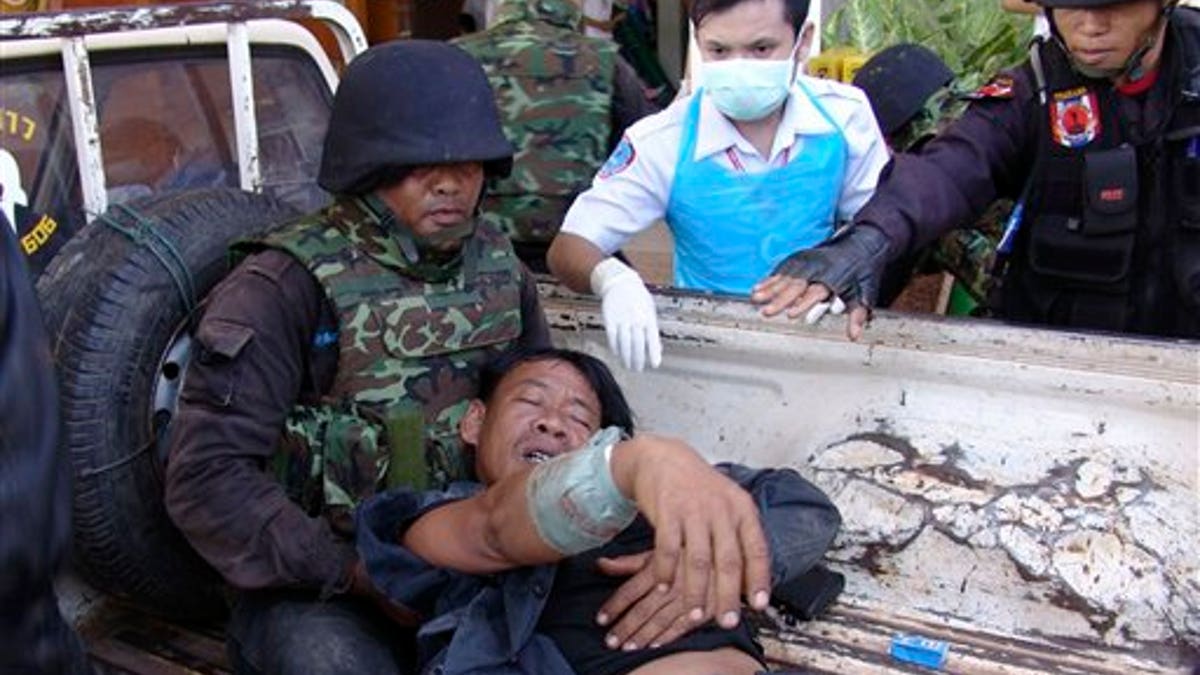
April 22: A Thai soldier injured in a fighting with Cambodia is helped by his comrades and a nurse after arriving at a hospital in Phnom Dongrak district of Surin province, northeastern Thailand. Thailand and Cambodia exchanged artillery and gunfire for several hours along their disputed frontier Friday in a new flare-up of their long-running conflict. It was the first skirmish reported since the two Southeast Asian countries battled for four straight days in February at the 11th century Preah Vihear temple. (AP) (AP2011)
PHNOM PENH, Cambodia – Renewed fighting between Thai and Cambodian troops on the countries' disputed border has killed at least 10 soldiers and kept thousands of civilians out of their homes.
Officials from both countries said fighting that lasted several hours Friday resumed Saturday, and at least 10 soldiers had died over the two days. The fighting continued most of the morning and involved mostly long-distance shelling but also use of small arms.
Cambodia also accused the Thai Army of firing shells with poison gas, an allegation which could not be independently verified and was rejected by Thailand.
The fighting springs from decades-old competing claims over small swaths of land along the border, with nationalistic politics fueling tensions. Clashes have erupted several times since 2008, when Cambodia's 11th century Preah Vihear temple on the border was given U.N. World Heritage status over Thai objections.
Friday's fighting was the first reported since four days of fighting in February, when eight soldiers and civilians were killed near the Preah Vihear temple, about 100 miles east of the new flare-up.
Cambodian government spokesman Phay Siphan said fighting resumed at about 6 a.m. Saturday at the same three locations where troops from both countries battled for several hours the previous day with artillery and small arms.
Wachira Kitphan, an official in Thailand's Phanom Dong Rak district, said both sides engaged in an artillery duel until about 8 a.m. Saturday.
Cambodian officials said that in addition to skirmishes Friday near the ancient temples of Ta Krabey and Ta Moan and a third point, artillery fell on villages and other areas as far as 13 miles inside its territory.
Each side blamed the other for the resumption of fighting.
Thai army spokeswoman Lt. Col. Siriya Khuangsirikul said three Thai soldiers were killed Friday and 13 were wounded, one critically. Cambodian defense spokesman Lt. Gen. Chhum Socheat said three Cambodian soldiers were killed and six wounded.
No reports of casualties from Saturday's clash were immediately available.
Cambodia's Bayon TV, which has close links to the government, showed footage Friday night of damaged houses and civilians being evacuated by farm vehicles to schools and Buddhist pagodas 30 miles from the front lines.
A statement from the Foreign Affairs Ministry of Thailand said the country had "exercised its inherent right of self-defense on the basis of necessity, proportionality and strictly directed at military targets from where the attacks were launched by Cambodian troops."
Indonesia, chair of the Association of Southeast Asian Nations, called Friday for an immediate cease-fire and further efforts to resolve the border dispute. Fighting stopped by early Friday afternoon, but no cease-fire was reached, Cambodian officials said.
Tensions between the neighbors have been exacerbated in recent months in part by pressure from influential Thai nationalist groups that have protested in Bangkok, urging the government to take back disputed border territory. Hardcore nationalists insist a 1962 World Court ruling awarding the Preah Vihear temple to Cambodia was unfair.
The flare-up comes as the Thai military raises its profile in domestic politics ahead of a general election expected to be held by early July. The army had previously effectively vetoed an agreed-on plan to station Indonesian observers to monitor the border situation, flexing its muscles in the foreign policy field.
Cambodian Foreign Minister Hor Namhong sent a note to the president of the U.N. Security Council accusing Thailand of refusing to accept the Indonesian monitors so it could carry out "this deliberate act of aggression."
Thai Prime Minister Abhisit Vejjajiva called for a meeting of one of the bilateral committees the two countries have set up to discuss border issues.
Reiterating Thailand's stance on its dispute with Cambodia, Abhisit said it was not necessary for ASEAN or other multinational bodies to take up the matter, because then "it will be harder to solve."
Cambodia insists bilateral talks are unproductive and that a third party's participation would be useful.








































